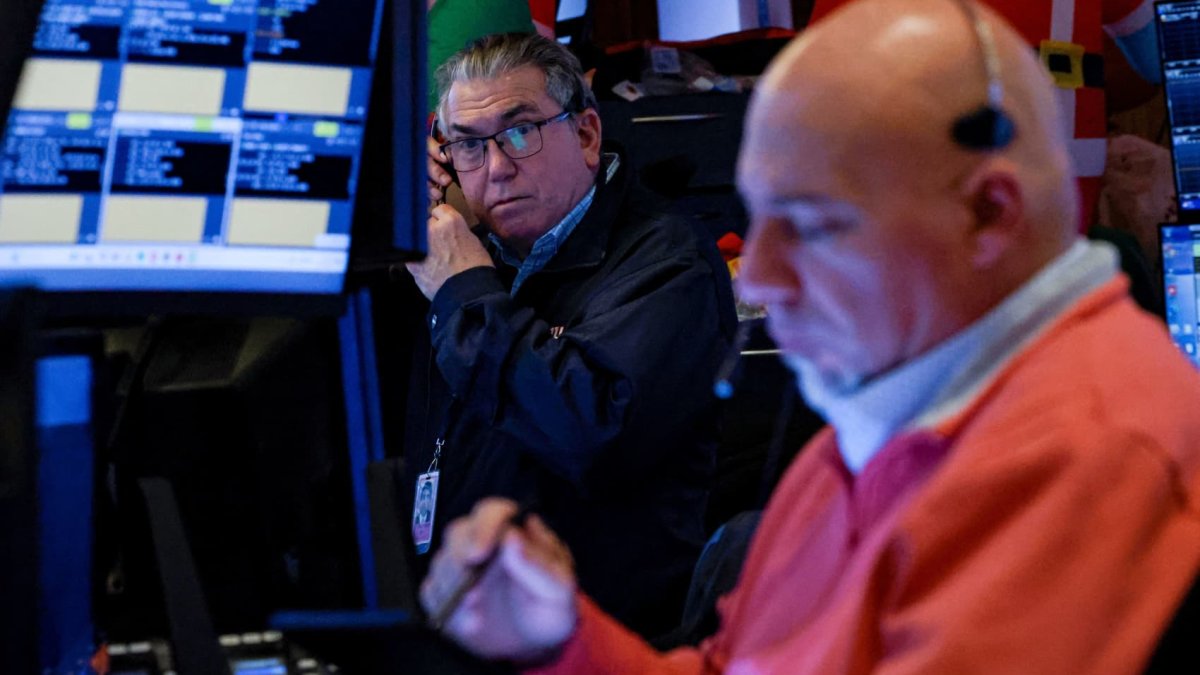This is CNBC’s live blog covering European markets.
European markets traded in negative territory early Tuesday as central banks take center stage this week.
The pan-European Stoxx 600 index traded 0.4% lower with most sectors in negative territory, as well as all major European bourses.
A focal point for global markets this week is the U.S. Federal Reserve’s final two-day policy meeting of the year. The meeting kicks off Tuesday, with the central bank’s monetary policy decision due Dec. 18.
Traders are pricing in a 95% chance of a quarter-point cut Wednesday, according to CME Group’s Fed Watch tool. Investors will also be looking out for clues to future policy moves from Chair Jerome Powell’s press conference after the meeting.
The Bank of England then meets on Thursday, with markets so far pricing in only a slim chance of a final rate cut of the year.
Germany’s DAX index was trading 0.2% higher in the wake of Chancellor Olaf Scholz losing a confidence vote in the German parliament on Monday. The vote paves the way for a snap election on Feb. 23. Scholz had wanted to lose the vote in order for fresh elections to be triggered. The move came after the collapse of his coalition government last month.
Overnight, Asia-Pacific markets traded mixed Tuesday, while U.S. stock futures inched lower Monday evening.
Data releases in Europe Tuesday include U.K. unemployment figures and Germany’s Ifo business climate and economic sentiment index.
Market focus shifting away from Trump’s ‘virtues’, says Vital Knowledge
The initial excitement around Donald Trump’s re-election is dissipating, according to Adam Crisafulli of Vital Knowledge.
“The market’s underlying mood has been deteriorating for a few days, and it crumbled further on Monday, with investors growing increasingly concerned about poor breadth and shifting their focus away from Trump’s virtues (deregulation, tax relief) and toward his potential headwinds (higher deficits, tariffs, etc.),” he wrote in a note.
“Meanwhile, the approaching pivot in Fed policy is another factor feeding into the more cautious narrative, with the market pricing in a dramatic slowdown in the pace of easing (with the 25bp cut due on Wed, the Fed will have slashed rates by 100bp since Sept, or an annualized pace of 300bp, but the Street is currently assuming just 50bp for all of 2025),” he said.
— Fred Imbert
German business sentiment deteriorates amid ‘chronic’ weakness
Shoppers at the Alexanderplatz in Berlin, Germany, on Wednesday, Sept. 25, 2024.
Sentiment among companies in Germany has worsened over the last month amid “chronic” weakness in the wider economy, a survey by the country’s Ifo Institute showed Tuesday.
The Ifo Business Climate Index fell in December to 84.7 points, down from 85.6 points in November, the lowest level since May 2020. Analysts polled by Reuters expected a reading of 85.6.
The decline was due in particular to more pessimistic expectations, Ifo President Clemens Fuest said in a statement, noting that “the weakness of the German economy has become chronic.”
“In manufacturing, the index fell markedly. Companies were less satisfied with current business. Their expectations were also significantly gloomier. The order situation deteriorated again. Production cutbacks have been announced,” he remarked.
The business climate has also deteriorated in the service sector, too. “This was due to the companies’ noticeably more skeptical expectations. However, the current situation was assessed as somewhat better,” Fuest said.
— Holly Ellyatt
UK pay growth speeds up, adding to worries for Bank of England

A pedestrian crosses the streets in front of The Bank of England illuminated by a ray of sunlight, in central London, on February 12, 2024.
British pay rose by more than expected in the three months to October, official data showed on Tuesday, prompting investors to further rein in bets on Bank of England interest rate cuts next year, despite warning signs of a slowdown in the economy.
Average weekly earnings, excluding bonuses, were 5.2% higher in the three months to the end of October than a year earlier, the Office for National Statistics said. A Reuters poll of economists had mostly forecast a rise of 5.0%.
“Today’s data release will do little to shift the Bank’s focus away from worrying about high inflation to more towards worrying about weak activity,” Ashley Webb, UK economist at Capital Economics, said.
Sterling jumped by more than a third of a cent against the U.S. dollar after the figures were published. Investors pared back BoE rate cut bets to fully price in just two quarter-point cuts in borrowing costs between now and the end of 2025.
The central bank is widely expected to keep interest rates on hold on Thursday after its December meeting as it waits to see the impact of finance minister Rachel Reeves’ Oct. 30 budget – and its higher costs for employers – on the jobs market.
— Reuters
China to raise budget deficit to a record 4% of GDP, says Reuters
Chinese leaders have decided to increase the country’s budget deficit to 4% of GDP for next year in a bid to keep economic growth at around 5% next year, Reuters reported on Tuesday, citing two sources familiar with the matter.
This new deficit target, which will be the highest on record, marks a sharp increase from the 3% of GDP target for 2024. The additional one percentage point of GDP translates to additional government spending of around 1.3 trillion yuan ($178.5 billion), Reuters said.
Reuters said the decision was made at last week’s Central Economic Work Conference, but the targets haven’t been officially announced.
China’s benchmark CSI 300 traded 1.1% higher Tuesday afternoon, while Hong Kong’s Hang Seng Index rose 0.39%.
—Lee Ying Shan
Swiss economy to grow 1.5% next year, government forecasts

Switzerland
The Swiss economy will grow by 1.5% next year, the government forecast on Tuesday, slightly revising down its outlook for one of Europe’s traditionally most resilient economies.
This year, the economy is expected to grow 0.9%. Switzerland’s export-oriented economy had previously been forecast to grow by 1.2% this year and 1.6% next year, the State Secretariat for Economic Affairs (SECO) said.
In 2026, the government expects Swiss economic output to expand by 1.7%, its first prediction for that year.
All three forecasts were below the long-term average for Swiss economic growth of 1.8%, and reflect the impact of a slowdown in Europe and further afield.
SECO said domestic demand is likely to be a key driver of growth next year in Switzerland, which is having to weather subdued demand for its goods in Germany and China.
— Reuters
Germany’s auto giants were already reeling. Things could get worse under Trump
President-elect Donald Trump’s pledge to impose a blanket tariff on all goods coming into the U.S. could wreak havoc for European carmakers, with Germany’s crisis-stricken automotive sector thought to be particularly vulnerable.
Speaking on the campaign trail in late September, Trump announced his desire to turn Germany’s auto giants into American car firms.
“I want German car companies to become American car companies. I want them to build their plants here,” Trump said in Savannah, Georgia. He added that the word tariff was “one of the most beautiful words I’ve ever heard” and “music to my ears.”

An employee of the Volkswagen plant in Zwickau stands next to the VW logo on the factory premises during an information event organised by the Works Council of Volkswagen Saxony in Zwickau, eastern Germany, on October 28, 2024.
Europe wasn’t mentioned in Trump’s first tariff announcement but EU policymakers will likely be worried that it’s just a matter of time before the president-elect turns his attention to the 27-nation bloc’s auto sector.
For Germany, the prospect of U.S. tariffs on European autos comes at a time when it’s top original equipment manufacturers (OEMs) are already reeling.
Read more on the story here: Germany’s auto giants were already reeling. Now Trump wants to turn them into American companies
— Sam Meredith
Risk commentary may overshadow Fed dot plot this week, State Street strategist says
Wednesday’s Fed decision will come with an updated summary of economic projections from FOMC members, including a new “dot plot” that projects the path of interest rate cuts.
However, the more interesting output from the meeting could be commentary about how the central bank views the risks of inflation and a potential rise in unemployment, said Cayla Seder, macro multi-asset strategist at State Street.
“The December SEP is interesting in that the soonest date is a whole year away. A lot can happen in a single year, so where I think we’ll get a bit more color and a bit more clarity is actually in the text around the SEP as opposed to the dots themselves,” Seder said.
One area of the dot plot that could be impactful is the final point, representing the terminal rate. A move higher could indicate that Fed officials think the so-called neutral interest rate is higher than they previously thought.
“We’ve consistently seen that rise. I think that’s one thing that would hint at a hawkish cut,” Seder added.
— Jesse Pound
German Chancellor Olaf Scholz loses confidence vote, clearing the way for February election

German Chancellor Olaf Scholz walks to meet with Romanian President Klaus Iohannis at the Chancellery for bilateral talks, in Berlin, Germany, November 15, 2024.
German Chancellor Olaf Scholz on Monday lost a confidence vote in the country’s Bundestag, clearing the path for an early election in February.
Scholz was expected — and hoping — to lose the vote, which he had called for himself in November in order to trigger earlier-than-planned elections, which were originally scheduled for the fall of 2025.
It marks only the sixth time in Germany’s history that such a vote has taken place, and the fourth time a president has fallen foul of the vote.
Scholz said Monday that he had called the vote not only for parliament but the whole of the electorate.
Read more on what comes next here
— Sophie Kiderlin
German government failure and February snap election are headwinds for Eurozone stocks: Capital Economics
The failure of German Chancellor Olaf Scholz’s government in a parliamentary confidence vote and elections tentatiuvely set for Feb. 23 mean more challenges for euro-zone stocks markets, according to Capital Economics senior economist Hubert de Barochez.
The German DAX index has climbed 22% so far in 2024, but entitled a research report after the Bunestag vote, “Headwinds to euro-zone stock markets to blow harder.”
“While equities in Germany have managed to ride out weak growth and political uncertainty this year, those in France have not. We suspect that they will all fare poorly next year, as those adverse conditions remain and a trade war takes a toll, the economist wrote.
The European Central Bank can’t undertake the policies necessary to revive the European economy, Capital Economics said. “Individual governments are arguably the best placed to drive a turnaround in the economy,” de Barochez wrote. “But most of them seem either unable or unwilling to do so, and in particular those in the two biggest economies: Germany and France.”
— Scott Schnipper
CNBC Pro: 3 reasons why smaller European stocks are about to outperform: Deutsche Bank
Deutsche Bank strategists are expecting smaller European stocks to significantly outperform their larger counterparts in the coming months, citing three key factors that could drive this growth.
The investment bank says small-cap stocks have the potential to gain 18% every year over the next three years, if the three key macro-economic drivers were to play out.
CNBC Pro subscribers can read more here.
— Ganesh Rao
European markets: Here are the opening calls
European markets are expected to open lower Tuesday.
The U.K.’s FTSE 100 index is expected to open 18 points lower at 8,240, Germany’s DAX down 22 points at 20,291, France’s CAC down 12 points at 7,342 and Italy’s FTSE MIB down 129 points at 34,618, according to data from IG.
Data releases will include U.K. unemployment figures and Germany’s Ifo business climate and economic sentiment index.
— Holly Ellyatt

